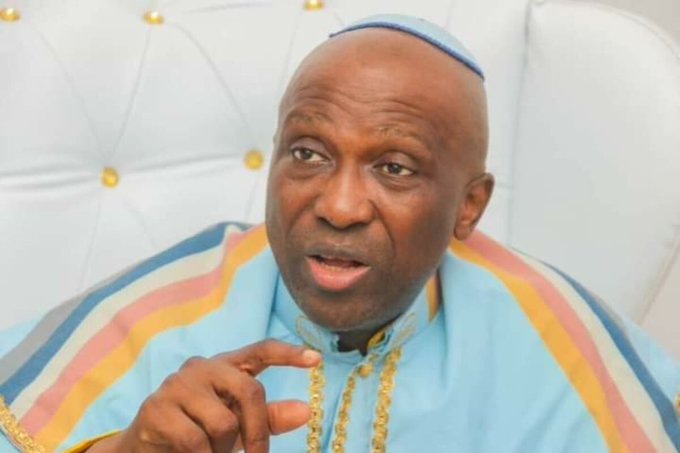Primate Elijah Ayodele, the leader of INRI Evangelical Spiritual Church, has raised a serious alarm about a looming threat of terrorist attacks in several parts of Nigeria. In a statement released on Tuesday, the controversial cleric outlined eight states he believes are at high risk of experiencing devastating strikes from terrorist groups in the coming months. His warning has sent ripples across the country, prompting both security agencies and concerned citizens to brace for potential violence.
The affected states, according to Ayodele, include Nasarawa, Gombe, Plateau, Kaduna, Bauchi, Benue, Abuja, and Kogi. These areas, he noted, could soon face violent disruptions if swift preventive actions are not taken.
A Call to Action for the Military
Ayodele’s statement was not just a warning but also a call for urgent action. He urged the Chief of Defence Staff (CDS) and the Chief of Army Staff (COAS) to intensify efforts in thwarting the potential attacks. The cleric stressed that the security leadership must develop and execute a comprehensive strategy to not only prevent these terrorist activities but also eradicate terrorism from the nation altogether.
“It is time for the CDS and COAS to sit together, strategize, and take immediate action to prevent these terrorists from causing destruction,” Ayodele said. “They have the power to neutralize this threat and should not allow these terrorists to tarnish their legacies or credibility.”
While Ayodele did not provide specific details on the exact nature of the attacks, his warning reflects a growing sense of concern over the ongoing terrorist activities in the country, which have escalated in recent years. He emphasized that the risk was real, and timely intervention was crucial to safeguard lives and property.
Escalating Terrorism Threats
The terrorist threat across Nigeria has remained a major concern for both the government and citizens alike. Several states have already witnessed violent attacks attributed to insurgent groups, with the northern and central regions particularly vulnerable. Ayodele’s mention of Nasarawa, Gombe, and Kaduna aligns with the frequent reports of Boko Haram and other terrorist factions operating in these regions.
Kaduna, in particular, has been a hotbed for attacks in recent years. The state, once known for its vibrant economy and diverse population, has seen a surge in terrorist activities, from bombings to kidnappings. The escalation of such incidents has left residents in fear, with many calling for stronger measures from security forces.
Similarly, the Central Nigerian state of Plateau, which has experienced ethnic and sectarian clashes in the past, remains a prime target for terrorist elements looking to exploit the existing instability. The growing insecurity in the region has sparked a humanitarian crisis, as communities flee their homes to avoid being caught in the crossfire.
In the southeastern states, Ayodele also mentioned an alarming plot by the Eastern Security Network (ESN), a militia group often linked to the outlawed Indigenous People of Biafra (IPOB). The ESN, according to Ayodele, is allegedly planning an attack in the South-East region. This, he warned, could include a high-profile target, specifically an emir.
“The ESN is planning an attack in the South-East. This is a red alert. They are targeting an important leader, an emir, and their plans could lead to great loss of life,” Ayodele cautioned.
Strategic Response Required
The call for a strategic response to the escalating security concerns comes at a time when Nigeria’s military and police forces have faced criticism over their handling of insurgency and terrorism. While the Nigerian government has made some strides in combatting insurgent groups like Boko Haram and ISWAP (Islamic State’s West Africa Province), many Nigerians remain unconvinced about the effectiveness of the response.
In light of this, Ayodele’s public appeal for military cooperation is a clear challenge to the current security framework. His call for the military leadership to prioritize the protection of citizens has sparked conversations on the effectiveness of the nation’s counter-terrorism operations.
For the people of Nasarawa, Gombe, and other states on the list, Ayodele’s statement serves as a wake-up call. Many residents in these areas have expressed concern over the lack of visible military presence, despite the heightened threat of attacks. The anticipation of violence has sparked anxiety among vulnerable communities, especially in areas where armed groups have been known to operate.
Background on Terrorism in Nigeria
Terrorism has long plagued Nigeria, particularly in the northern regions, with Boko Haram and its splinter factions leading the charge. These groups have wreaked havoc on villages, kidnapping, bombing, and carrying out attacks on government installations. Despite efforts by the Nigerian government, including the deployment of military forces, the insurgents have managed to maintain their presence, especially in remote regions.
The violence has since spread, with ISWAP and other criminal groups taking advantage of the instability in the region. The rising tide of insecurity has disrupted normal life, with citizens frequently caught in the crossfire of military operations and terrorist strikes.
In the South-East, the issue of militant groups such as the ESN has compounded the situation. The South-East, a region historically more peaceful compared to the rest of the country, has seen increasing unrest, partly due to the agitation for secession led by IPOB. The ESN has often clashed with security forces, leading to heightened tensions and an uncertain security environment.

